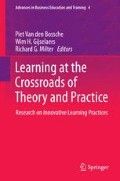Abstract
This chapter describes the experience of developing and delivering a module for first year undergraduate management students that combines traditional formal teaching methods with a range of informal methods based on student based activities. The problems inherent in evaluating the success of the module and the student learning achieved are discussed. The measures of success adopted are described together with the way in which some of the results from the last three cohorts are used in the annual redesign of the module. The chapter concludes with the eight issues that designers of similar modules need to consider and suggests some of the important factors for success.
Access this chapter
Tax calculation will be finalised at checkout
Purchases are for personal use only
References
Beekes, W. (2006). The ‘millionaire’ method for encouraging participation. Active Learning in Higher Education, 7(1), 25–36.
Bentley, T. (1998). Learning beyond the classroom: Education for a changing world. London: Routledge.
Boddy, D. (2008). Management: An introduction (4th ed.). Harlow: Pearson Education.
Boddy, D. (2011). Management: An Introduction (5th ed.). Harlow: Pearson Education.
Bopry, J. (2005). Levels of experience: An exploration for learning design. Educational Media International, 42(1), 83–89.
Carr, W., & Kemmis, S. (1986). Becoming critical. Education, knowledge and action research. Lewes: Routledge.
Cross, J. (2007). Informal learning: Rediscovering the natural pathways that inspire innovation and performance. San Francisco: Pfeiffer.
Debord, G. (1958). Theory of the dérive. http://www.bopsecrets.org/SI/2.derive.htm. Accessed 7 Feb 2010.
Eraut, M. (2000). Non-formal learning, implicit learning and tacit knowledge. In F. Coffield (Ed.), The importance of informal learning. Bristol: Policy Press.
Frandsen, M. (2006). Beyond planning, organizing, leading, and controlling. Journal of the Academy of Business Education, 7. http:/www.abe.sju.edu/proc2006/frandsen.pdf. Accessed 11 Aug 2010.
Freeman, M., & McKenzie, J. (2000). Self and peer assessment of student teamwork: Designing, implementing and evaluating SPARK, a confidential, web based system. In Flexible Learning for a Flexible Society. Proceedings of ASET-HERDSA 2000 Conference. Toowoomba, Queensland.
Garrison, D. R., Anderson, T., & Archer, W. (2000). Critical inquiry in a text-based environment: Computer conferencing in higher education. The Internet and Higher Education, 2(2–3), 87–105.
Goodyear, P. (2001). Effective networked learning in higher education, Vol. 3 of the Final Report JCALT, CSALT. University of Lancaster, Lancaster.
Kester, L., Sloep, P. B., Van Rosmalen, P., Brouns, F., Koné, M., & Koper, R. (2007). Facilitating community building in learning networks through peer-tutoring in ad hoc transient communities. International Journal of Web Based Communities, 3(2), 198–205. http://hdl.handle.net/1820/609. Accessed 7 Feb 2010.
Nicol, D. (2007). Laying a foundation for lifelong learning: Case studies of e-assessment in large 1st-year classes. British Journal of Educational Technology, 38(4), 668–678.
REAP. (2006). Questions to ask yourself about your assessment and feedback practices. http://www.reap.ac.uk/public/Resources/quests_to_ask_about_assess_011106.pdf. Accessed 11 Aug 2010.
Sinclair, I. (2002). London orbital: A walk round the M25. London: Penguin.
Stewart, R. (1967). Managers and their jobs. London: Macmillan
Author information
Authors and Affiliations
Corresponding author
Editor information
Editors and Affiliations
Rights and permissions
Copyright information
© 2012 Springer Science+Business Media Dordrecht
About this chapter
Cite this chapter
Rich, M., Brown, A. (2012). Combining Formal and Non-formal Learning for Undergraduate Management Students Based in London. In: Van den Bossche, P., Gijselaers, W., Milter, R. (eds) Learning at the Crossroads of Theory and Practice. Advances in Business Education and Training, vol 4. Springer, Dordrecht. https://doi.org/10.1007/978-94-007-2846-2_3
Download citation
DOI: https://doi.org/10.1007/978-94-007-2846-2_3
Published:
Publisher Name: Springer, Dordrecht
Print ISBN: 978-94-007-2845-5
Online ISBN: 978-94-007-2846-2
eBook Packages: Humanities, Social Sciences and LawEducation (R0)

